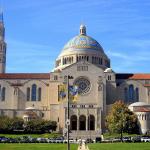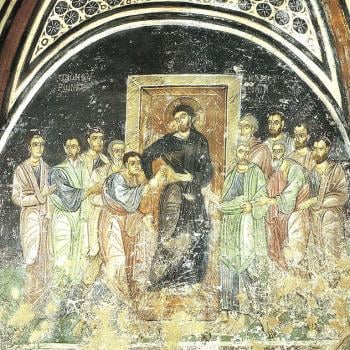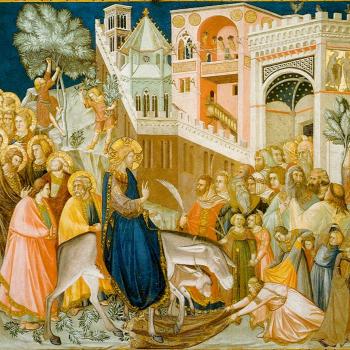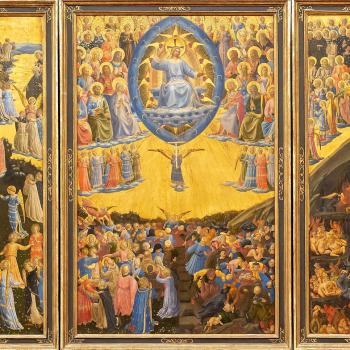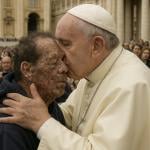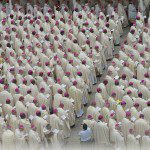 The Christian faith is supposed to be one of good news. Sadly, the way many Christians speak to others, it seems to be anything but good news. Jesus came to save the world, not to condemn it (cf. Jn. 3:17); why, then, do so many Christians seek any and every way they can to condemn others in the name of the Lord? The good news has turned sour. The good news has become bad news as the proclamation of the faith no longer is about the love of Jesus and how that loves should render us hopeful for the eschatological fate of the world. The doctrinal teaching of the church, the truth proclaimed by the church, is important, but we must keep in mind why they are important: because they serve Jesus Christ and give an explanation for the hope we have in him. Jesus came to give us the good news, and we must never subvert that good news. Jesus came to give us hope; the more we focus on that hope, the greater our faith and love will be. The less we focus on such hope, especially the hope in the way Jesus will work for and save others, the more we radically undermine the faith. We must not turn the faith into a mere sequence of propositions which must be believed, for when we do so, the greater the likelihood will be that our hope will be drained as we begin to fear that we will miss something, that we will get something wrong, and we will be condemned for it. Jesus never said we would be judged based upon what we know and can explain of the doctrines of the church: he said we would be judged in relation to how we love, for he is himself love and he wants us to follow him in love. With love, there is hope; with hope, the darkness of despair and unlove can be overcome.
The Christian faith is supposed to be one of good news. Sadly, the way many Christians speak to others, it seems to be anything but good news. Jesus came to save the world, not to condemn it (cf. Jn. 3:17); why, then, do so many Christians seek any and every way they can to condemn others in the name of the Lord? The good news has turned sour. The good news has become bad news as the proclamation of the faith no longer is about the love of Jesus and how that loves should render us hopeful for the eschatological fate of the world. The doctrinal teaching of the church, the truth proclaimed by the church, is important, but we must keep in mind why they are important: because they serve Jesus Christ and give an explanation for the hope we have in him. Jesus came to give us the good news, and we must never subvert that good news. Jesus came to give us hope; the more we focus on that hope, the greater our faith and love will be. The less we focus on such hope, especially the hope in the way Jesus will work for and save others, the more we radically undermine the faith. We must not turn the faith into a mere sequence of propositions which must be believed, for when we do so, the greater the likelihood will be that our hope will be drained as we begin to fear that we will miss something, that we will get something wrong, and we will be condemned for it. Jesus never said we would be judged based upon what we know and can explain of the doctrines of the church: he said we would be judged in relation to how we love, for he is himself love and he wants us to follow him in love. With love, there is hope; with hope, the darkness of despair and unlove can be overcome.
This is why we must focus on the good news, upon the hope which Jesus offers us. The more we remind ourselves of his love, the greater our hope can be. The more we contemplate the ways he loves us, the better we will realize that his work truly is to save the world, including us, even if we are the first among sinners[1]. Faith, hope and love should be our focus. Faith must not be confused with the ability to recite difficult theological formulations correctly, but rather, it is about our dependence upon and trust in Christ as well as our willingness to follow him and what he would have us do. Hope is grounded upon our trust with Christ: our faith gives us reason to hope for we know in Christ, all things will be reconciled. We have confidence, we have hope, that what God wanted to accomplish in the incarnation, God will achieve. We join ourselves to Christ, and so, as Peter explained, we have reason for our faith, to have confidence in God because of what God showed to us in Christ: “Through him you have confidence in God, who raised him from the dead and gave him glory, so that your faith and hope are in God” (1Ptr. 1:21 RSV). It is with confidence in the salvific work of Christ, work which was done for the sake of the whole world, we can and should have hope for our own of the whole world.
Things can look dark and terrible for us, as well as for the world. We must wait patiently in hope, expecting that God will accomplish what he set out to do, enticing us and the whole world to follow after him and receive the deifying grace which we all need. We might not see it now, but that is why, as Paul said, it is hope: for it is because we do not see it, we must hold out with our hope: “For in this hope we were saved. Now hope that is seen is not hope. For who hopes for what he sees? But if we hope for what we do not see, we wait for it with patience” (Rom. 8:24-5 RSV). The good news tells us why, when the world seems filled with corruption and sin, when even those who should know better, such as priests and bishops, seem tainted with great evil, we still must hold on to hope and realize that God’s will is going to be done, and all that sin will be justly dealt with by God, even as God offers in and through Christ Jesus the means of overcoming all the effects of sin. We see before us the contamination of evil, and the corruption of the institutional church which Christ set up; we should, of course, be upset at how the church has been usurped by those who want to use it for power and glory and all kinds of ungodly pursuits. But the church is at the center of the human experience, it is at the heart of the world, and what is in the world and the human experience, will flow into it, even as blood flows in and through our bodies, taking with it the toxins and poisons that can be found in our body. We might not see it now: we might not see it in our lifetime, but Christ is taking all of this into himself, so that he can put himself to work with it, correcting and purifying the disease found within in the church even as he vaccinates the world through the antibodies created by his fight against the contagions within the church. The antibodies will take time to develop so that they can fend of the infections we see before us, and like many vaccines, the antibodies can eventually lose their effectiveness, creating the need for more vaccinations: but what we need to do is hold out in hope that God will accomplish his work, and the correctives needed, no matter how painful they might be, will be done. The church, and the world at large, will be better once those correctives have truly been established and put into effect.
This hope, that in and through Christ, all things will be made well, was beautifully indicated by Julian of Norwich:
For truly as we shall be in the bliss of God without end, praising and thanking him. so truly have we been in God’s prevision loved and known in his endless purpose from without beginning. In this love without beginning he created us; and in the same love he protects us, and never allows us to be hurt, by which our bliss might be decreased. And therefore when the judgment is given, and we are all brought up above, we shall then clearly see in God the mysteries which are now hidden from us. And then shall none of us be moved to say in any matter: Lord, if it had been so, it would have been well. But we shall say with one voice: Lord, blessed may you be, because it is so, it is well; and now we truly see that everything is dome as it was ordained by you before anything was made.[2]
This is the good news, this is the preaching of the Gospel. We might not know how we will get there (though we know it will be done by the God-man Jesus Christ, through the church as an instrument for this achievement), but we must know that God’s will will be done on earth as it is in heaven, and this means all things will be well. When people debate the eschaton, and what it will be like, this should be the foundation: all things will be well. This is not to say we should care less about the process by which this is achieved, and that we can ignore sin and put off its correction to the future. Sin hurts, because it is a spiritual sickness. Just because we know we will get well does not mean we want to ever be sick. The more we can do to prevent sickness, the better we will be. Nonetheless, we know that if we get sick, the doctor will be there to make sure we can recover and once again be made. If we fear we cannot get better, then our anxiety will make experience with our illness will be worse, and we might begin to act foolishly, doing things which will make the illness last longer than it should.
The good news, while preached by Jesus, and indeed, executed by him, was also at the heart of the law and prophets. Isaiah said that in the eschatological glory of the messianic kingdom, every tear, every sorrow will be wiped away:
On this mountain the LORD of hosts will make for all peoples a feast of fat things, a feast of wine on the lees, of fat things full of marrow, of wine on the lees well refined. And he will destroy on this mountain the covering that is cast over all peoples, the veil that is spread over all nations. He will swallow up death for ever, and the Lord GOD will wipe away tears from all faces, and the reproach of his people he will take away from all the earth; for the LORD has spoken (Isa 25:6-8 RSV).
Death, the ultimate representation of our spiritual sickness, will be vanquished, and all things will be well. The Lord has spoken: the reproach of the people of God, the reproach of sin, will be taken away – and has been taken away by the lamb of God slain from the foundation of the world. God is love, and in his love, God works for making all things well, and this indeed, is why all things will be God. This is the meaning of the good news, which Julian of Norwich also explained:
What, do you wish to know your Lord’s meaning in this thing? Know well, love was his meaning. Who reveals it to you? Love. What did he reveal to you? Love. Why does he reveal it to you? For love. Remain in this, and you will know more of the same. But you will never now different, without end. [3]
Love is the foundation, love is the reason, love is the end. All things will be well for God is love, and in that love, God will love all things so that all things will be well. “Therefore gird up your minds, be sober, set your hope fully upon the grace that is coming to you at the revelation of Jesus Christ” (1Ptr. 1:13 RSV). The good news of Jesus Christ is the good news that God is love, and in that love, all things will be well. This must be the center of our preaching. This must be our focus. All things will be well.
[IMG=Julian of Norwich. Photograph upbloaded by Matt Brown [CC 2.0] via Flickr]
[1] Likewise, we should recognize that Jesus works to save others, including those who we are quick to judge and condemn.
[2] Julian of Norwich, The Showings. Trans. Edmund Colledge, OSA and James Walsh, SJ (New York: Paulist Press, 1978), 341 [Long text].
[3] Julian of Norwich, The Showings, 342 [Long text].
Stay in touch! Like A Little Bit of Nothing on Facebook



